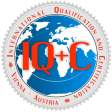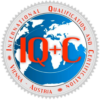Welcome To Online Workshop
ISO/IEC 27001:2022
Information security, cybersecurity and privacy protection — Information security management systems — Requirements
In today's digital age, information security is paramount to the success of any business. ISO 27001 is one of the most popular international standards for Information Security Management Systems (ISMS). It provides a framework for organizations to manage and protect their sensitive information assets from threats such as cyber-attacks, data breaches, and theft.
Reserve your training session by sending an email to support@iqc-vienna.com
Understanding ISO 27001
The Importance of Information Security
In today's digital world, information is a valuable asset that needs to be protected. Organizations hold a vast amount of sensitive data, including financial records, customer details, and intellectual property. Hence, it is essential to have a robust information security management system (ISMS) to safeguard against cyber-attacks, data breaches, and other security incidents.
The Basics of ISO 27001
ISO 27001 is an international standard that provides a framework for implementing and maintaining an ISMS. This standard outlines a systematic approach to managing and protecting sensitive information through risk assessment, implementation of security controls, and continuous improvement.
Key Components of ISO 27001
The essential components of ISO 27001 include policy and objectives, risk assessment and management, security controls, internal audit, and management review. It is crucial to have a holistic and systematic approach to information security management, ensuring that all aspects of the organization are covered.
Why is ISO 27001 Important for Your Business?
Protecting Your Business From Cyber Threats
The implementation of ISO 27001 helps protect your business from cyber threats and data breaches that can lead to significant financial losses, reputational damage, and legal consequences. Having an ISMS in place ensures that sensitive information is managed and protected appropriately.
Compliance With Data Protection Regulations
ISO 27001 compliance ensures that your organization complies with data protection regulations such as GDPR, HIPAA, and CCPA. This compliance helps to avoid costly fines, penalties, and legal actions resulting from non-compliance.
Building Trust With Customers and Stakeholders
Implementing ISO 27001 helps build trust with customers and other stakeholders who entrust your organization with sensitive data. Certification to this standard demonstrates that your organization takes information security seriously and has implemented appropriate measures to protect sensitive information.
How to Implement ISO 27001: A Step-by-Step Guide
Scoping the Implementation Project
The first step in implementing ISO 27001 is to define the objectives and scope of the implementation project. This involves identifying the assets that need protection, the people involved, and the boundaries of the ISMS.
Risk Assessment and Management
The second step is to conduct a risk assessment to identify potential threats and vulnerabilities. This involves assessing the likelihood and impact of each risk and defining appropriate controls to mitigate the risks.
Implementing Security Controls
The third step involves implementing security controls to mitigate identified risks. These controls can include technical measures such as firewalls and encryption, as well as organizational and administrative measures such as policies and procedures.
Internal Auditing and Management Review
The final step involves conducting periodic internal audits to ensure that the ISMS is functioning effectively and efficiently. Management review provides a strategic overview of the ISMS and ensures that it aligns with the organization's objectives.
ISO 27001 Certification: What You Need to Know
The Certification Process
The certification process involves a third-party audit to ensure that your organization's ISMS meets the requirements of ISO 27001. The certification body will review your organization's policies, procedures, and controls to determine compliance.
Choosing a Certification Body
Choosing the right certification body is critical. The certification body's reputation, experience, and expertise play a significant role in the certification process. It is crucial to select a certification body that has a solid track record and is accredited by a recognized accreditation body.
Preparing for the Certification Audit
Preparation is key to a successful certification audit. Before the audit, it is recommended to conduct a pre-audit to identify any gaps in the ISMS and implement corrective actions. Communication and collaboration with the certification body are also essential to ensure a smooth certification process.
Common Misconceptions About ISO 27001
Myth: ISO 27001 is Only for Large Corporations
Contrary to popular belief, ISO 27001 is not only for large corporations. Small and medium-sized businesses can also benefit from implementing the standard to improve their information security management. In fact, ISO 27001 is particularly useful for smaller organizations that lack the resources to have an in-house information security team. The standard provides a clear framework for managing information security risks and can be customized to fit the needs of any organization.
Myth: ISO 27001 is Too Expensive to Implement
While implementing ISO 27001 does require an investment of time and resources, it is not necessarily expensive. The cost of implementing the standard can vary depending on the size and complexity of the organization, but the benefits of improving information security management can outweigh the costs. In addition, ISO 27001 can help organizations identify cost-saving opportunities by streamlining their information security processes and reducing the likelihood of costly security incidents.
Myth: ISO 27001 is a One-Time Project
ISO 27001 is not a one-time project, but rather a continuous process of improving information security management. Organizations need to regularly review and update their information security policies, procedures, and controls to ensure they remain effective and relevant. Implementing ISO 27001 is only the first step in a journey towards continual improvement and maintaining compliance with the standard.
More Options. No Obligations.
Pay as you go. No long-term contracts.
Workshop Structure
- 1st Session: 3rd week of October
- 2nd Session: 4th week of October
- 3rd Session: To be arranged individually
- Online workshop via Zoom
- Fees include Workshop & Certification
Benefits of ISO 27001 Certification
Improved Information Security
The primary benefit of ISO 27001 certification is improved information security management. By implementing the standard, organizations can identify and manage information security risks and implement controls to protect their assets from threats. This can help prevent data breaches, cyber-attacks, and other security incidents that can harm an organization's reputation, finances, and operations.
Compliance With Industry Standards
ISO 27001 is an internationally recognized information security standard that is widely adopted by organizations in various industries. By obtaining certification, organizations can demonstrate their commitment to information security and compliance with industry standards. This can help build trust with customers, partners, and other stakeholders.
Competitive Advantage
ISO 27001 certification can also provide a competitive advantage for organizations in the marketplace. Customers and partners are increasingly concerned about information security and may require their vendors and suppliers to have ISO 27001 certification. By obtaining certification, organizations can differentiate themselves from their competitors and potentially win new business.
Note: Minimum No of trainees 6
Any organization, regardless of size or industry, can obtain ISO 27001 certification as long as it has implemented and maintained an effective Information Security Management System (ISMS) that complies with the standard's requirements.
The cost of implementing and obtaining certification varies depending on the size and complexity of the organization and the level of support required from external consultants. However, it is generally agreed that the cost of obtaining certification is far less than the cost of a data breach.
No. ISO 27001 is a continuous improvement process that requires regular monitoring and review of the ISMS to ensure it remains effective and relevant to the organization's changing needs and evolving cyber threats.
The time it takes to obtain certification depends on several factors, including the size and complexity of the organization, the level of preparedness, and the certification body's availability. However, on average, the process can take anywhere from six months to two years.
The highlights of this course:
- Scope
- Normative references
- Terms and definitions
- Context of the organization
- Leadership
- Planning
- Support
- Operation
- Performance
- Improvement
3rd session (1 - 2 hours): To be arranged individually
This will be arranged individually. It is the Certification Audit Interview. In this interview, the Lead Auditor asks the candidates about:
-
- The ISO/IEC 27001:2022 Requirements
- The Structure of the ISO/IEC 27001:2022 Handbook
- The mandatory Documents / Procedures / Records
- The other important ISO Standards
- Registration
- 2 Workshop sessions
- Documentation (Standard texts, plus samples, etc.)
- e-book ISO/IEC 27001:2022
- Special WhatsApp group to be connected with the group members and the Coach.
- Certificate issuing fees
- Yearly registration fees for the 1st year
- The online certification interview as a freelancer (1-2 hours)
Maryam Alaboud, Translator - KSA
The sessions were insightful and provided me with the fundamentals of professional translation services. Also, the sessions have broadened my understanding of translation project management and delivery. Last but not least, it is essential to note that Dr. Mohamed-Ali Ibrahim delivered information thoroughly and clearly, which helped achieve the full potential of the overall experience.
Thank you,
إن الحمدلله أولاً وأخيراً،
حصلت على شهادة الآيزو 17100 في جودة خدمات الترجمة للأفراد
كل الشكر لكل من ساندني وشجعني وعلى رأسهم الدكتور الفاضل Dr. Mohamed-Ali Ibrahim، أشكر له مهنيته وتفانيه وحرصه الشديد على أن تسير جلسات التقييم بالشكل الاحترافي الأمثل.
Thank God first and foremost,
I got the ISO 17100 Certificate in the quality of translation services for individuals
All thanks to all those who supported me and encouraged me, led by Dr. Mohamed-Ali Ibrahim, I thank him for his professionalism, dedication, and .keenness that the evaluation sessions go in such a professional way.
Maha Alfaleh
Felwa Almazyad
Translator at SDAIA | سدايا
I’m pleased to announce that I have a certification of #iso #iso17100 17100:2015-05
Special thanks to Dr. Mohamed-Ali Ibrahim for his support and guidance during the journey.
Aura AlMutlaq
Riyadh - KSA
Dear Dr. Mohamed-Ali Ibrahim
Greetings,
I am very honored to have this golden opportunity with you, this course was extremely enriching and has widened my view on many aspects.
My utmost gratitude,
Maintaining ISO 27001 Compliance: Best Practices and Tips
Establishing a Culture of Information Security
Maintaining ISO 27001 compliance requires establishing a culture of information security within an organization. All employees need to understand the importance of information security and their role in protecting the organization's assets. This can be achieved through regular training and awareness programs that focus on information security best practices and the consequences of non-compliance.
Regular Internal Audits and Reviews
Organizations need to regularly conduct internal audits and reviews to ensure they remain compliant with ISO 27001. This can help identify areas for improvement and ensure that information security policies, procedures, and controls remain effective and relevant. Internal audits should be conducted by qualified and independent auditors to ensure objectivity and impartiality.
Continuous Improvement and Adaptation
Continuous improvement and adaptation are key to maintaining ISO 27001 compliance. Organizations need to continuously monitor and assess their information security risks and make necessary changes to their policies, procedures, and controls. This can help ensure that the organization remains protected from emerging threats and that their information security management system remains effective and relevant over time.In conclusion, ISO 27001 provides a comprehensive framework for managing and protecting sensitive information assets from ever-increasing cyber threats. It not only helps businesses comply with data protection regulations but also builds trust with customers and stakeholders while providing a competitive edge. While implementing and obtaining certification can be a time-consuming process, the long-term benefits outweigh the short-term costs. By following best practices and maintaining compliance, businesses can stay ahead of evolving threats and protect their valuable information assets.
Enroll for Free Newsletter updates
We'll send you a periodic update.
Don't worry, it's not the least bit annoying.
Ready to find out more?
Book here a strategical session with the Senior Lead Auditor free of charge to discuss all the details:
About Your Instructor
DR. MOHAMED-ALI IBRAHIM
د. محمد علي إبراهيم

Top Skills
Master in Interpretation
Honors-Awards
- Austrian State Award
- International German Award
- SABRE International Award (PR Oscar)
-Best Practice Award, Vienna-Austria
-Top Expert 2021 and 2022 in Quality Management (Erfolg 2021 and 2022)
Publications المؤلفات
25 books (on Amazon) about Business Administration, Quality Management, and Translation Science.
The most important literature on the platform AMAZON
The Senior Lead Auditor of ATC AUSTRIA
CEO of IQC-Vienna, International Qualification & Certification, Vienna, Austria
Dr. Mohamed-Ali Ibrahim is an accredited Lead Auditor for the following Standards: ISO/IEC 27001:2022 Information security management systems, ISO 9001:2015 Quality Management Systems, the International PR Standard CMS
ISO HR Standards: ISO 10667-1:2020 / ISO 10667-2:2020 / ISO 24179:2020 / ISO 30401:2018 / ISO 30405:2016 / ISO 30406:2017 / ISO 30407:2017 / ISO 30408:2016 / ISO 30409:2016 / ISO 30410:2018 / ISO 30411:2018 / ISO 30414:2018 / 30423:2021
ISO Standards in the Education: ISO 29991:2014 / ISO 29993:2017 / ISO 29994:2017 / ISO 21001:2018
Plus the following 10 further ISO Standards in the Translation/Localization/MPE industry: ( ISO 21989, ISO 20228, ISO 2603, ISO 24019, ISO 18841, ISO 21720, ISO 20771, ISO 22259, ISO 11669, ISO 23155).
*
The expertise includes Consultation, Training, and Certification.
*
A former member of the Standards Committee at the Austrian Quality Authority and participated in developing the European Norm EN15038 for the field of translation
which became the basis for ISO17100:2015
*
Conducted +750 different Quality Audits (Pre-Audits, Initial Audits, Surveillance Audits, and Recertification Audits) worldwide.
*
Key-note speaker at international sector conferences. Trainer, Coach, Consultant, and Lead Auditor since 1998.
*
Master in Translation Studies from Karl-Franzens University, Graz, Austria
*
Master in Interpretation from Karl-Franzens University, Graz, Austria
*
Ph.D. in Quality & Risk Management in healthcare institutions
TESTIMONIALS

By mere coincidence, for four years now, I have been lucky to know Dr. Ibrahim. In the beginning, as always the case for unknown areas, I was skeptical about ISO, certifications, and standards. In our first meeting, Dr. Ibrahim provided a short professional summary of ISO certification, and we agreed to proceed to the next steps. We walked the steps together, preparing the certification manual, building the system, and educating all involved parties (stakeholders) on the standard translation process. However, unfortunately, we couldn't have the certification from the first initial audit for some defaults in our system; however, under the guidance, patience, and support of Dr. Ibrahim, we were able, after three months from the date of the first audit, to achieve the certification. It was an extraordinary deep-dive experience that resulted in endless opportunities in business development, a developed mindset towards business, and quality perspectives, on the corporate and personal levels, for me as the company owner. Later to this experience, and fortunately, I had the honor to participate with Dr. Ibrahim through several conferences, workshops, meetings, and subsequent surveillance audits addressing the ISO certification. Through a very close dealing with Dr. Ibrahim, I knew him as professional, tactful, highly committed, fulfilling his promises, supportive, enthusiastic, optimistic, and always inspiring all people around him towards success and excellence. Throughout years of experience with Dr. Ibrahim, I believe he is an authentic influencer for whoever is seeking excellence, success, professionalism, an updated business mindset, or an entrepreneurial spirit on all levels, corporate or personal. With all my best wishes and due respect,
Ahmad Mutamad
CEO at TRANSTEC LocalizationJune 24

We had a very positive experience with you, First, you helped us well understand the basic meanings of the various terms that are used in the translation world, then you helped us implement the requirements of the ISO 17100, and finally, you always had ideas to improve. Thank you for your kind and professional cooperation for all these 5 years.
Mostafa Saeednejad
CEO TransNet Iran

I rarely come across real talents who stand out like Dr. Mohamed-Ali Ibrahim. I worked with Dr. Mohamed-Ali Ibrahim for three years, collaborating on several project teams. Dr. Mohamed-Ali Ibrahim's ability to handle multiple projects was unlike any I've seen before and dramatically increased our company's productivity. No matter how tense a meeting, Dr. Mohamed-Ali Ibrahim made sure everyone left with a smile. As a leader, Dr. Mohamed-Ali Ibrahim earns my highest recommendation.
Mr.Saadi Djeffal
CEO chez KOST GROUP

Dear Dr. Mohamed,
Hope this email finds you well and safe. It is an honor to write such a testimonial, Dr. Please find below a few humble words that would never reflect your real value.
Testimonial:
"I was first introduced to the subject of ISO 17100:2015 certification, almost 2 years ago. Given the complex scope and extensive logistics of the certification requirements, I thought it would take me ages to obtain it. However, when I got serious about pursuing all steps and requirements, I started with attending orientation sessions and online introductions conducted by Ph. Dr. Mohamed-Ali Ibrahim, ISO Senior Lead Auditor, Representative of MENA Region, and a remarkable expert in this field. He worked with me step by step to make the process as easy as possible, explaining how to build my professional qualifying handbook that reflects my 20+ years of expertise, how to conform with every single detail within the ISO 17100 standards following the structured processes. About Dr. Ibrahim's supportive and exceptional guidance, he added more value at every stage I have been accomplishing to fulfill the requirements, providing me with key resources. He also helped me identify new methodologies to incorporate in my current processes, with a focus on business improvements.
PhD Mohamed-Ali Ibrahim is a very professional, knowledgeable and easy expert to work with. His words of encouragement and inspiring approach made me feel more willing to deep dive for translation industry new technologies that were even emerging during my certification stage. dr Ibrahim drove me through the limitless boundaries of inspiration and non-stop learning.
I encourage all translators around the region to take this significant step towards a professionally recognized path. Acquiring ISO 17100:2015 demonstrates your commitment to meeting client/business needs by delivering best practice translation services, which can lead to higher profits and distinguished recognition. Applying such flawless process, translation management system is now stronger, easy to track, review, evaluate and come out with a reliable and consistent service.
I would like to thank you Dr. Mohamed-Ali Ibrahim for your professionalism both prior and during my recent certification process. It has been a great honor working with you. I appreciate all your efforts. I am looking forward to the surveillance audit next October ISA."
Best regards,
Abir Zidan
Free-Lance USAID ISO 17100 Certified Translator & APTN-Certified Translator

Dear Dr. Mohamed Ali Ibrahim,
No words can express our gratitude for your generous and continuous support.
We highly recommend you to any translator wishing to make use of such a great and unique expertise in the field of ISO certification.

Besten Dank für ihre professionelle Begleitung unseres Qualitätssystems! Das angenehme Klima und ihr tiefgreifendes Verständnis unserer Abläufe, sowie ihre Unterstützung bei der Umsetzung unserer Maßnahmen haben unsere Entwicklung beflügelt!
Nochmals besten Dank für die objektive Behandlung beim Audit!
Christian Bucher Mag
Managing Director, Staff 24

My first encounter with Dr. Mohamad Ali Ibrahim was in 2008 when I embarked on obtaining my EN-15038 certification. From the first moment, I realized how professional Dr. Mohamad is, as he knows the whereabouts of the translation business well.
Until this very day, Dr. Mohamad Ali Ibrahim was a man of his words, always keeping sharp appointments for the Audits he conducted.
Dr. Mohamad Ali Ibrahim and I took part in many events where we both delivered our expertise and knowledge about the ISO 17100 certification.
Dr. Mohamad Ali Ibrahim never tolerates any shortcomings or pitfalls on the people he does Audits for, but he is also very supportive and collaborative.
The advice I have received throughout my entire acquaintance period with Dr. Mohamad Ali Ibrahim had a great impact on my business as a professional freelance translator.
Dr. Mohamad Ali Ibrahim always comes with brilliant ideas and I consider him one of the industry visionaries.
ما هو أعلاه لا يفيك حقك دكتور محمد بكل تأكيد
أخوك الأصغر سامح رجب
Sameh Ragab
ISO 17100 Lead Auditor and Certified Translation Provider UN and Worldbank Registered Translation Vendor

I had the pleasure and honor of meeting Dr. Mohamed-Ali Ibrahim during the first week of September 2018, when I was assigned by our Leadership to support our Translation Branch Manager and Deputy Translation Manager of the largest Translation Section at Vinnell Arabia in Riyadh, Kingdom of Saudi Arabia.
By this time, Dr. Mohamed Ibrahim had been working with our Translation Branch Deputy Manager on ISO 17100 for over 8 months, impressing on her the competitive advantage that ISO 17100 Certification provides to our business. At the end of this period, our Translation Branch Deputy Manager understood clearly the significant business value the ISO Certification would bring to our Translation Branch. She also gained a major appreciation of effective business processes structure the ISO 17100 Standard deployment would add to our Translation Branchland she decided to pursue the ISO Certification. As result, she requested my management of my support since I had the responsibility of all Quality Management Systems deployments at Vinnell Arabia.
When I started working with Dr. Mohamed Ibrahim, I was very surprised, impressed, and very pleased immediately to learn of his exceptional Translation Services experience, knowledge, and qualification considering the extensive ISO 17100 Certifications he deployed successfully for over 200 Companies Globally, by conducting +500 different Certification/Recertification/Surveillance Audits.
We immediately decided to contract Dr. Mohamed-Ali Ibrahim for helping us deploy both ISO 17100 Translation Services and ISO 9001 Quality Management at our Translation Branch. He executed successfully ISO 17100 Lead Auditor and ISO 9001:2015 Quality Representative Certification Trainings, followed by a competency ISO 17100 Specialized Translation Service Certification for a select number of our key Translators and Proofreads quickly building the ISO technical knowledge of our Translation Department Team.
With Dr. Mohamed's outstanding guidance and support, we successfully accomplished over the past 3 years ISO 17100 Translation Services and ISO 9001 Quality Management Certification of 2 of our key 4 Translation Sections making us accomplish a very significant milestone in our Translation Branch history.
We cannot speak enough of our appreciation of Dr. Mohamed's professionalism and exceptional ISO 17100 and ISO 9001 technical knowledge and guidance coupled with the ardent desire to transfer significant Translation Industry knowledge to his Customers due to his very strong Subject Matter Expertise(SME) in this field and his belief in making his Customers the very best business in their market, while at the same time being a very tough and strict ATC Austria ISO 17100 and ISO 9001 Lead Auditor during his Customers site Certification and Surveillance Audits.
We highly commend him for his excellent services and recommend him highly based on the excellent and positive experience we had with him in our Organization.
Hassan Farah
Mission Assurance Director Northrop Grumman Vinnell Arabia Subsidiary, Kingdom of Saudi-Arabia.

I was honored to work with the Senior Lead Auditor Dr. Ibrahim, one of the most respected experts in the localization and language services industry.
One of his most important goals is to spread quality standards and encourage others to adhere to them as well as to develop their workflow to meet the international quality standards.
The certification process with Dr. Ibrahim helped us in STAR Middle East to improve our way of thinking, processes, and tools, for the purpose of obtaining customer satisfaction.
In STAR Middle East, Dr. Ibrahim helped our team to improve their quality and workflow. His advice and recommendations helped us a lot in upgrading our workflow and ensuring the highest level of quality.
Dr. Ibrahim explained to us how to fulfill the requirements of the ISO standard and the certification process. He encouraged our team to work in accordance with international quality standards. I highly recommend other translation companies to work with him because he handled and managed his duties and given promises in a professional way.
Wael Elemam
Business Development Manager, STAR Middle East

Dear Dr. Mohamed-Ali IBRAHIM,
Initially, I would like to express my deepest gratitude for your onsite visit to our company. We are very pleased and proud of the audit results.
We enjoyed working with you and want to thank you for your professional and companionable nature as you conducted our audit. All the staff at Language Empire had very positive things to say and enjoyed discussing with you how they contribute to their work. We appreciate your knowledge and expertise in ISO and look forward to implementing your suggestions in order to improve our Quality Control system. We were very pleased with the audit method and look forward to working with you in the future. I assure you that we will keep the hard work up to implement all expected recommendations.
Kindest regards,
Jaber Abd Alkhaliq
Linguist Relations Manager Language Empire Ltd

Dear Professor
Dr. Ibrahim
I hope you are in the best of health.
Thank you very much for your visit to our company and your support for it through your kind recommendation to support the continuation of granting us the ISO certificates ISO 17100 & ISO 18587, which are a badge on our chest and an incentive for us to continue the development efforts that we started with you as soon as we were granted this global appreciation.
As we declare our desire to you, we renew our pledge to continue working on developing and modernizing everything related to our company in terms of science and theoretical and technical knowledge to reach the highest levels that companies operating in this field aspire to.
Once again, we thank you for your generous willingness to support us in everything related to the development of our company at all levels.
Yours sincerely.
Mamdouh Askar
CEO – Star Middle East, Cairo – Egypt


